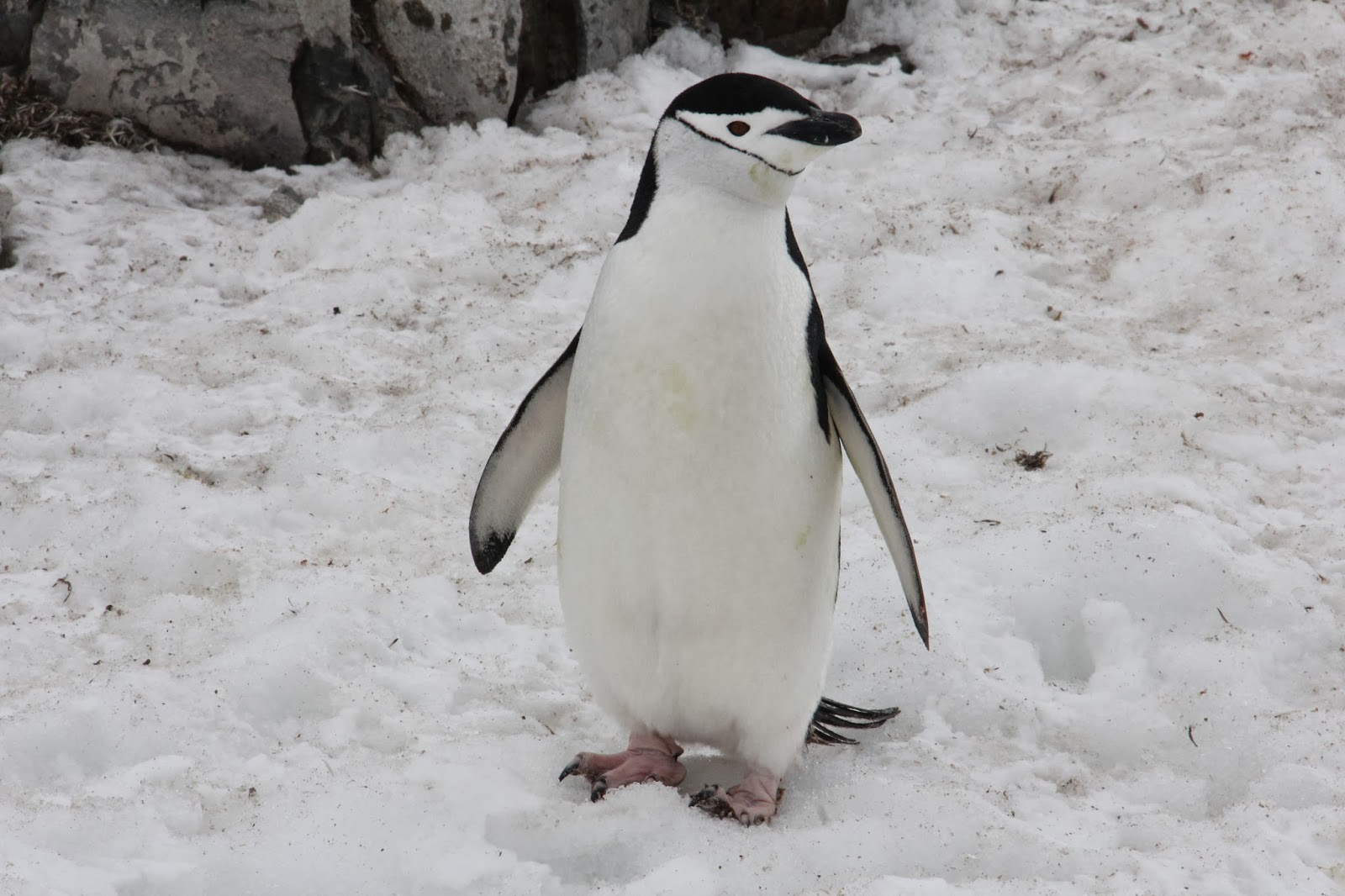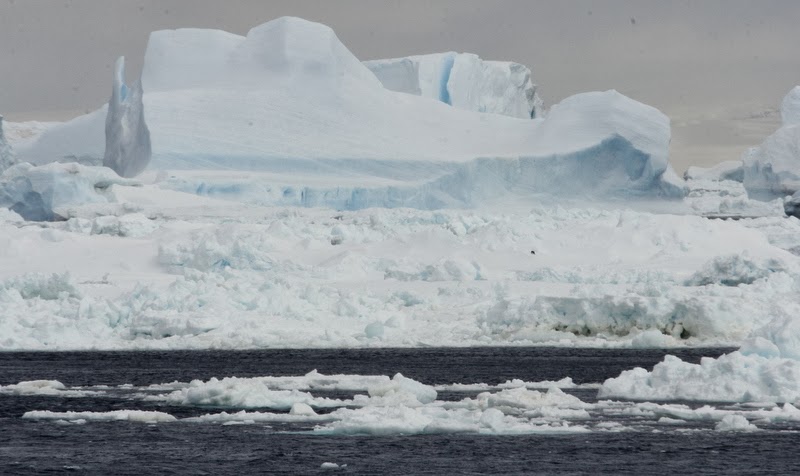We set sail for Elephant Island that evening. The light was incredible & we were treated to some magnificent coastal vistas. However, it was windy & it steadily became colder.
Our last views of the incredible, South Georgia.
A taste of things to come - as we sailed further
south, icebergs became common.
We had a full three days at sea and as it turned out, the sea birding was great, but the conditions steadily deteriorated. We experienced gales, increasingly rough seas, rain, sleet, snow & even a bit of fog! I spent most of my time up top on, or even inside the bridge, the birding was challenging at times. But was it worth it? Read on!
What all the best sea watchers
are wearing this year!
Going was quite slow at times.
I awoke early to find the sun shining, but it was really windy & as the day wore on, it became a gale & the sky turned a lead grey. Birding was great; a few Light-mantled Sooty Albatrosses & Black-browed Albatrosses were around. But the main event of the morning was ploughing through up to 50,000 Antarctic Prions. They were everywhere!
Black-browed Albatross - easily the most
numerous albatross in these seas.
Just a small part, of this immense flock
of Antarctic Prions.
Antarctic Prions
The overwhelmingly numerous. Antarctic Prion.
Blue Petrel
As the day wore on Blue Petrels became numerous & I reckon over 10,000 birds were logged by the end of the day!
Kerguelan Petrel - a star bird!
I managed to find two great rarities this day: Kerguelan Petrel & South Georgia Diving Petrel. The Kerguelan Petrel was like lightening, wildly arching through sea & sky at right angles to the ship. Even though it didn't hang around it was a wonderful sighting.
I had seen around 30+ Common Diving Petrels & was actively looking for its rarer brethren! Most diving petrels are flushed from virtually underneath the boat. They fly low, fast, like bullets & they can be hard to identify conclusively. But one bird I saw well & got a couple of shots. It was a South Georgian! Brilliant!
South Georgian Diving Petrel!
All the identification features are on show -
if you look carefully!
This little beauty, made me very happy!
Day two at sea revealed a dark, brooding overcast sky. The wind had picked up a little & conditions out on deck were a little challenging. Most of the time I was on my own, but just a few of the gang periodically kept me company.
Barbara, Steve, Klaus & Cassandra - thanks guys,
for being brilliant companions.
Birding was much slower than the previous day. Numbers of Antarctic Prions were low, around 1,500+ birds; Blue Petrels were also down to around 350. Cape Petrels were ever present, particularly round the stern of the ship in the wake. A Northern Giant Petrel turned out to be my last one for a while. White-chinned Petrels; Southern Fulmars and Wilson's Storm Petrels could often be seen throughout the day, albeit in small numbers.
Northern Giant Petrel
White-chinned Petrel
The very graceful, Southern Fulmar.
Several Fin Whales were seen
on this leg of the voyage.
Gentoo Penguins on the iceberg!
More penguins on the right flank!
They just kept getting larger & more numerous!
And this was the reason why we were seeing lots
of icebergs - we had crossed the Antarctic convergence!
Day three, was the 1st December. It was brighter, but there were huge swells & birding was difficult. Amazingly 6 Gentoo Penguins were seen - we were miles & miles from anywhere near land! Southern Fulmars became common (200+); Cape Petrels abundant (5,000+); & Blue Petrels were still much in evidence (120+).
What a bird - the fantastic Antarctic Petrel!
The bird of the day was without doubt Antarctic Petrel. In total I had three different birds by the end of the day. I was made up! The last cruise didn't record any at all! Wow! I watched them repeatedly circling the ship & enjoyed prolonged, great views. However, photographing them was challenging, as they didn't half wiz around & were somewhat unpredictable in their flight patterns.
A dark phase, South Polar Skua.
The other great bird was a South Polar Skua which suddenly turned up, hung around for a few minutes & quickly departed.
I turned in early this evening. it was so cold & the welcoming bar beckoned! The first vodka martini was just perfect!
Dawn saw us anchored off Elephant Island. It was a gloriously sunny, wonderful morning but when I looked across to Elephant Island I felt a shudder run down my spine! The problem was I knew the story! I am looking and can't see anywhere where it would be possible to survive an Antarctic winter! We anchored off Point Wild. This is the place where Frank Wild looked after 21 men while Shackleton & five others sailed off to look for help, in what became one of the most arduous & amazing endurance journeys of all time. Wild & the other men were here for 105 days living on a tiny bit of rock which occasionally got covered by gigantic waves. When you see the place, it is hard to imagine anyone surviving here for long, but survive they did in the most appalling of conditions.
My first glimpse of Elephant Island.
It doesn't look very homely!
We are on our way!
Sarah, who has been here before!
Getting up close & personal in the zodiacs.
Chinstrap Penguins at the base of the glacier.
What is truly amazing is how high these
Chinstrap Penguins actually climb!
The bust of Captain Luis Pardo,
who rescued the men on 30th August 1916.
This memorial was erected in 1988.
Braying to the world!
Charismatic? Or what?
My very first Antarctic Shag!
This shot cost me my new camera though.
Four weeks old & hit by the sea = totally buggered!
Oh! Did I mention I saw 8 Snow Petrels?
Candidate for one of the most bizarre
but lovely, birds in the world.
On the way back to the ship.
Notice the sea ice forming!
Leaving Elephant Island.
As we sailed further south, icebergs of all
shapes & sizes became commonplace.
The little &....
The not so little!













%2520At%2520Sea%2520to%2520South%2520Georgia%252018.03.06%5B1%5D.jpg)
%2520At%2520Sea%2520to%2520Gough%252022.03.06%5B1%5D.jpg)














































No comments:
Post a Comment